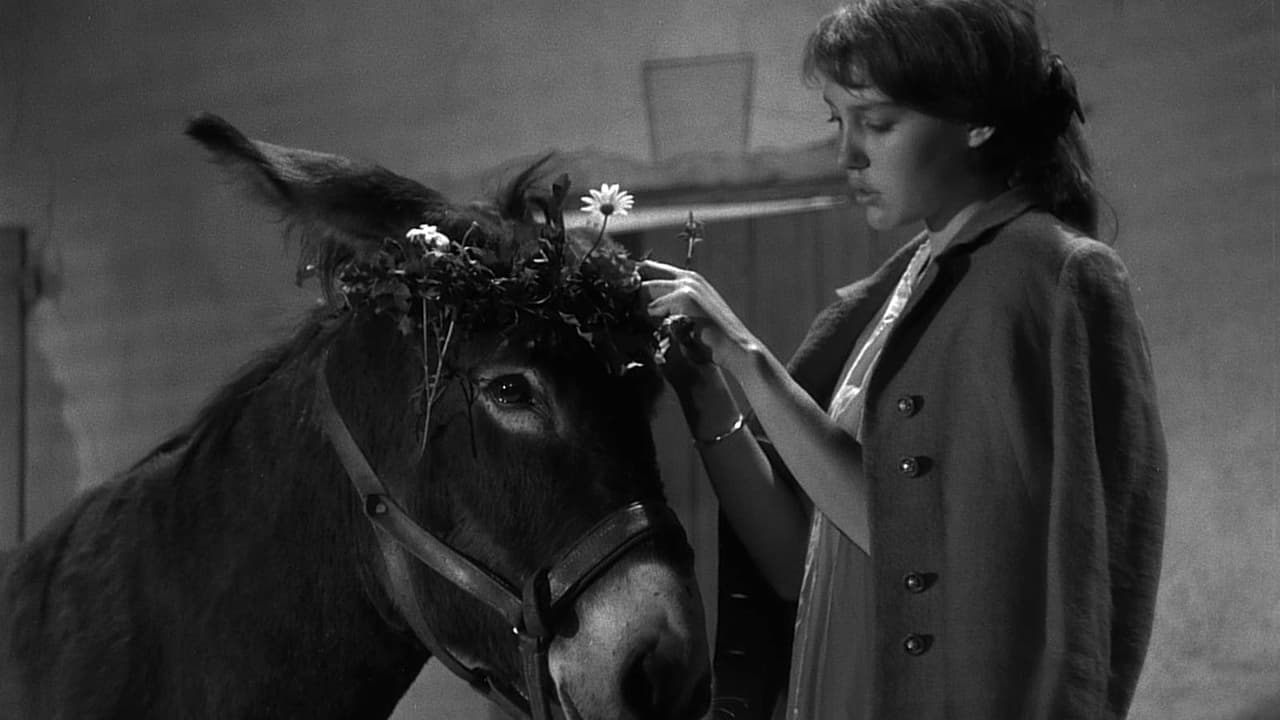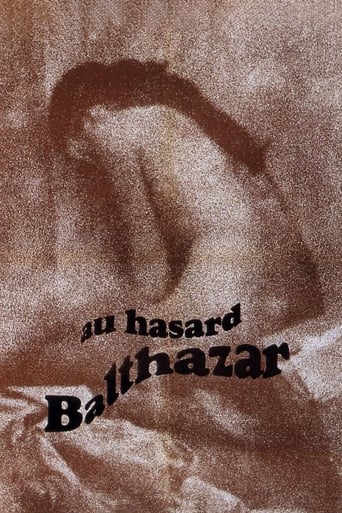

The Worst Film Ever
... View MoreGreat movie! If you want to be entertained and have a few good laughs, see this movie. The music is also very good,
... View MoreGreat movie. Not sure what people expected but I found it highly entertaining.
... View MoreThere's a more than satisfactory amount of boom-boom in the movie's trim running time.
... View MoreThe pace of this movie--both of the PLOT and of the physical movement of the characters and the action of the scenes is very slow--like audiences needed more help to "catch up" with what's happening in 1966 when this film was released. It reminded me of another "classic" but dreadfully-paced foreign movie--Dreyer's "DAY OF WRATH"--ugh! Beyond that, the film seems to have an "instructional" storybook quality to it--like it's saying to the audience: "This is what you're supposed to Think!!" And then the Dread that hang's over the whole movie because you think someone is going to mutilate or kill the donkey. Robert Bresson is supposed to be an important and classic film-maker, but I've never "gotten" him. I tried very hard to stay awake during "Lancelot du Lac" and thought it was stupid and felt ripped off. It is possible to be artful and "symbolic" and metaphorical in good films! For rural French life--there are all the writing of Georges Simenon and the many movies made from them. For provincial life and aimless, cruel youth there is Fellini's I Vitelloni.
... View MoreThe main character in this harsh movie is an animal, a donkey (Balthazar), whose fate lies in the hands of his masters. In a world full of naked violence, economical exploitation, cheating, sadism and rape, only one family treats Balthazar correctly. Its members will pay the price for it. The donkey is the only really innocent living being in this world; indeed, a saint.Robert Bresson's main obsession was not to shoot 'theatre' scenes. The element 'actor' in his movies was turned into a kind of set piece. All sorts of emotion had to be suppressed, because being 'theatrical'. But, his view was too rigid. Slightly more emotion, more lively dialogues or more passionate gesticulation would have made his movies 'warmer', more human, more moving. Notwithstanding this, his film is still an astonishing masterpiece. A must see for all movie buffs.
... View MoreIn Balthazar, a donkey is a silent witness to the cruelty and indifference of human beings as he is passed from one owner to the other. Suffering is his lot in life, a suffering that is mirrored in the life of his original owner, young Marie, whose innocence is trampled on and abused by a young man to whom she has given herself unselfishly.It is from that suffering, however, that grace is revealed and shown without adornment in a concluding scene of simple, yet profound beauty. Bresson himself describes this most eloquently: ". . . the more life is what it is - ordinary, simple, without pronouncing the word 'God' - the more I see the presence of God in that." To Bresson, sainthood is available to all, even to the most debased creatures.
... View MoreI recently watched this movie for a film course, and scrolling the user reviews on IMDb out of curiosity I came upon Flavia's review, "Unjustified Criticism", from back in 2010, and laughed my ass (get it?) off on the spot. Congratulations, sir or madam - you are the very image of the snobby, elitist pseudo-intellectual cinephile! Yes, of COURSE the only reasons some "primitive" commoner might dislike "Au Hasard Belthazar" is because they would rather be watching "The Matrix" or because it gives them boo-boo feelings in their hearts. Of COURSE. You even made sure to point a finger at "society", that vague, eternal enemy of the masturbatory would-be intelligentsia. Good on you, mate!!Well, having seen the film knowing of its adoration among critics and intellectuals, and been subsequently underwhelmed by it, allow me to share my own assessment, in hopes that Flavia may find my criticisms more "justified" than the plebeians who came before me.I could hardly call "Au Hasard Belthazar" a "bad" film. It more or less succeeds at being what it wants to be - a bleak, muted, melodramatic little parable of fatalism and misanthropy. I admit I don't entirely get the accusations that the film is incoherent or obtuse (at least in its meaning; its plot is another story, as I will address below) - as art films go, this one is ridiculously straightforward. Its core message, simplified and paraphrased by way of popular idiom: "Life's a bitch, and then you die." Not rocket science, and certainly not Kant.I possibly (probably) lack the formal background in film technique at present to properly explain what is so remarkable about its cinematography, editing, etc. - none of it particularly stood out to me, one way or the other - but with so many gray-haired film critics in agreement over its aesthetic genius, I guess I'll just take their word for it until further notice.But just because the film is "good" from a strictly artistic standpoint doesn't mean I have to like it. And I sure as heck didn't. I didn't HATE it, or even really think that poorly of it overall (in the pantheon of pretentious art films, there are countless far more obnoxious specimens more deserving of my distaste) but there are an awful lot of things about it I didn't like. I didn't like its deliberately obtuse, choppy and incomplete "plot" "structure". I "got" it, but I didn't like it. I can't believe there was no way of communicating the theme of Belthazar's ignorance ("innocence") of the greater world around him without all but taunting the viewer. I didn't like the dour, mechanical manner in which it goes about its business, with only a single scene (the circus) suggesting anything resembling a sense of humor or liveliness, and that being gone as quickly and abruptly as it arrives. I didn't like the stilted, disaffectedly gloomy acting and dialogue, presenting human beings as mere two-dimensional figures in a cosmic diorama rather than independent entities with believable thoughts, feelings and behaviors operating within a web of existence larger than themselves (the essence of great tragedy, in my opinion). I didn't like the way it grasped at images of suffering and abuse for easy pathos - the final scene was powerful, yes, but even as I felt saddened by it I also felt manipulated. And I didn't like the way it contrived the worst possible outcome for every situation, just as a heavy-handed means of proving its point about how life is suffering and human nature is deeply corrupt (did you know Bresson was a hardcore Catholic?).Anyone in touch with the real world outside of the hermetic sphere occupied by artists and intellectuals shouldn't have much difficulty guessing why the average viewer probably won't care much for "Au Hasard Belthasar". It's dour, it's muted, it's impossible to follow on any level beneath that of pure allegory, it doesn't have much insight to impart to any world-wise person that they don't already know, and yeah, it's not very entertaining. Some may appreciate the message or the craftsmanship, and I can respect that. But to claim that disliking "Au Hasard Belthazar" could only be a result of some deep-seated deficiency on the part of the viewer is pure self-servicing nonsense.
... View More